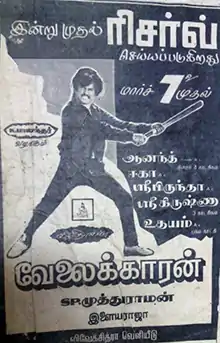| Velaikkaran | |
|---|---|
 Theatrical release poster | |
| Directed by | S. P. Muthuraman |
| Screenplay by | K. Balachander |
| Based on | Namak Halaal |
| Produced by | Rajam Balachander Pushpa Kandaswamy |
| Starring | Rajinikanth Sarath Babu Pallavi Amala |
| Cinematography | T. S. Vinayagam |
| Edited by | R. Vittal C. Lancy |
| Music by | Ilaiyaraaja |
Production company | |
Release date |
|
| Country | India |
| Language | Tamil |
Velaikkaran (pronounced [ʋeːlaɪkkaːɾan] transl. Servant) is a 1987 Indian Tamil-language masala film directed by S. P. Muthuraman, starring Rajinikanth, Sarath Babu, Amala and Pallavi. It is a remake of the 1982 Hindi film Namak Halaal.[1] The film was released on 7 March 1987 and became a box office success.
Plot
Ragupathy was brought up by his paternal grandfather, Valayapathy. He decides to go to the city in search of a new job and life. In the city he meets Vaiyapuri, who guides him into an interview in a 5-star hotel owned by Rajkumar. While in the hotel, Ragupathy meets Kowsalya and falls in love with her, and Rajkumar falls in love with Nisha. During this time, many attempts are made to kill Rajkumar by his uncle and son Pounraj. The blame for this murder attaches to Rajkumar's mother Savithri, who is actually Ragupathy's mother. Realising all this, Ragupathy takes an oath that he will not let harm come to Rajkumar.
Cast
- Rajinikanth as Raghupathi
- Sarath Babu as Rajkumar
- Pallavi as Nisha
- Amala as Kausalya
- K. R. Vijaya as Savithri
- Srikanth as Gajapathi
- Achamillai Gopi as Hari
- Nassar as Pounraj
- R. N. Sudarshan as Dharmaraj
- V. K. Ramasamy as Valayapathi
- Delhi Ganesh
- Senthil as Vaiyapuri
- Shihan Hussaini
- A. Sakunthala
- Idichapuli Selvaraj
- Bayilvan Ranganathan
- Pyramid Natarajan
Production
Rajinikanth acted without taking any remuneration, due to the losses the producers suffered from Sri Raghavendrar (1985).[2] Since the film had scenes revolving in a hotel, those scenes were shot in Chola Hotel at Madras (now Chennai) and also at other hotels in Delhi, Kashmir and Agra.[3] For the song "Mamanukku", Muthuraman who was in search of an old couple made the song's dance choreographer Puliyur Saroja and the film's associate director S. L. Narayanan dance for the song.[4] In his memoir AVM Thandha SPM, Muthuraman said the song "Vaa Vaa" was shot at Shimla.[5] However, in his column for Hindu Tamil Thisai, Cinema Eduthu Paar, he said it was shot at Srinagar.[6]
Soundtrack
The soundtrack was composed by Ilaiyaraaja, with lyrics by Mu. Metha.[7][8] This is the first film where Mano sang for Rajinikanth.[9] The song "Vaa Vaa Kanna" is set in Hamsadhvani raga.[10][11]
| No. | Title | Singer(s) | Length |
|---|---|---|---|
| 1. | "Enakku Thaa Un Uyirai" | B. S. Sasirekha | 4:28 |
| 2. | "Maamanukku Mayilapoorethaan" | Malaysia Vasudevan | 4:36 |
| 3. | "Pethu Eduthavathaan" | Malaysia Vasudevan | 4:34 |
| 4. | "Va Va Va Kanna" | Mano, K. S. Chithra | 5:53 |
| 5. | "Velai Ilathavan" | Mano | 4:24 |
| 6. | "Thotathile Paathi" | S. P. Balasubrahmanyam, Saibaba | 4:34 |
| Total length: | 28:29 | ||
Release and reception
Velaikkaran was released on 7 March 1987.[12] The Indian Express called it "pretty run of the mill stuff".[13] Jayamanmadhan of Kalki criticised the story.[14] The film became a box office success,[15] and Rajinikanth won the Sunflash Award for Best Actor.[16]
References
- ↑ Sharma, Devesh (22 July 2016). "King of remakes". Filmfare. Archived from the original on 9 November 2019. Retrieved 18 May 2018.
- ↑ "Rajinikanth was the first hero to do film without taking money: Tirupur Subramaniam". The Times of India. 3 September 2020. Archived from the original on 28 July 2021. Retrieved 28 July 2021.
- ↑ முத்துராமன், எஸ்.பி. (28 September 2016). "சினிமா எடுத்துப் பார் 77: ரஜினி பேசிய இங்கிலீஷ்". Hindu Tamil Thisai (in Tamil). Archived from the original on 30 March 2023. Retrieved 30 March 2023.
- ↑ Muthuraman 2017, p. 307.
- ↑ Muthuraman 2017, pp. 306–307.
- ↑ முத்துராமன், எஸ்.பி. (5 October 2016). "சினிமா எடுத்துப் பார் 78: குளிரால் ரஜினி கால்மீது ஏறிக்கொண்ட அமலா". Hindu Tamil Thisai (in Tamil). Archived from the original on 30 March 2023. Retrieved 30 March 2023.
- ↑ "Velaikkaran Tamil Film LP Vinyl Record by Ilayaraaja". Mossymart. Archived from the original on 9 September 2021. Retrieved 9 September 2021.
- ↑ "Velaikaran (1987)". Raaga.com. Archived from the original on 16 April 2013. Retrieved 27 December 2013.
- ↑ Nadadhur, Srivathsan (6 June 2018). "Mano : The voice of Rajini". The Hindu. Archived from the original on 24 November 2020. Retrieved 9 September 2021.
- ↑ ராமானுஜன், டாக்டர் ஆர். (13 July 2018). "ராகயாத்திரை 13: 'தேர் கொண்டு சென்றவன் யாரென்று சொல்லடி'". Hindu Tamil Thisai (in Tamil). Archived from the original on 29 July 2019. Retrieved 29 July 2019.
- ↑ Sundararaman 2007, p. 164.
- ↑ "Velaikkaran". The Indian Express. 7 March 1987. p. 3. Retrieved 22 December 2018.
- ↑ NKS (20 March 1987). "Run-of-the-mill". The Indian Express. p. 14. Retrieved 22 December 2018.
- ↑ ஜெயமன்மதன் (19 April 1987). "வேலைக்காரன்". Kalki (in Tamil). p. 16. Archived from the original on 30 July 2022. Retrieved 23 February 2022.
- ↑ Ramachandran 2014, p. 112.
- ↑ Ramachandran 2014, p. 268.
Bibliography
- Muthuraman, S. P. (2017) [2005]. AVM Thandha SPM (in Tamil) (3rd ed.). Vikatan. OCLC 607342391.
- Ramachandran, Naman (2014) [2012]. Rajinikanth: The Definitive Biography. New Delhi: Penguin Books. ISBN 978-0-14-342111-5.
- Sundararaman (2007) [2005]. Raga Chintamani: A Guide to Carnatic Ragas Through Tamil Film Music (2nd ed.). Pichhamal Chintamani. OCLC 295034757.
External links
- Velaikkaran at IMDb